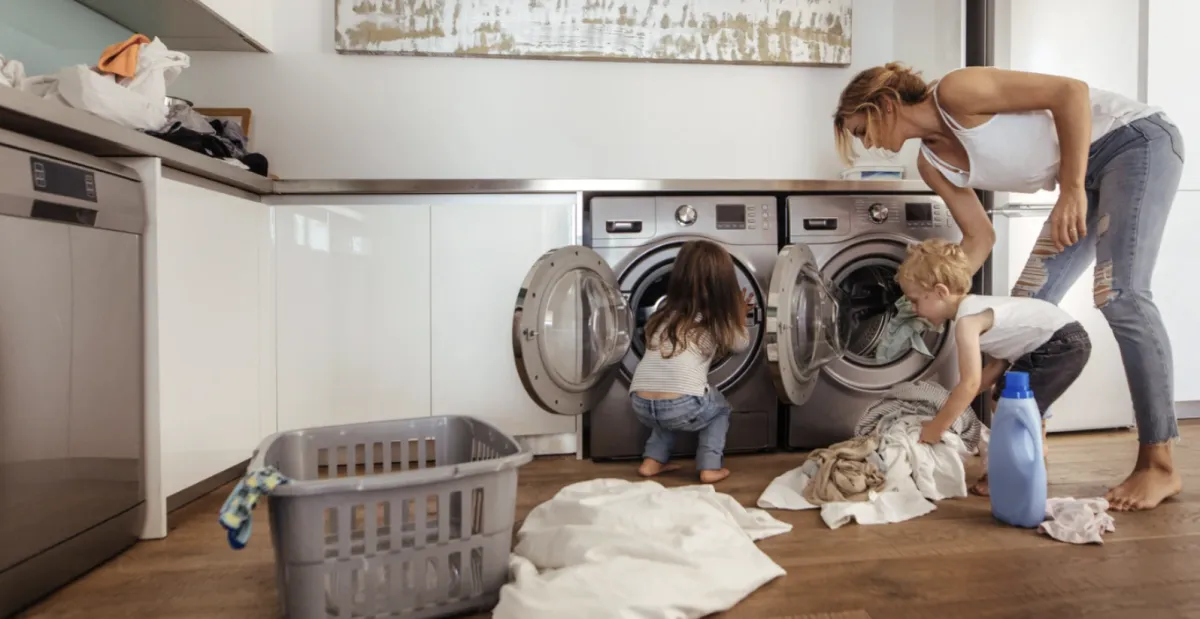
Why kids should do chores (...and why we shouldn’t call them chores!)
In this blog, we tackle the question of whether kids should do household chores... Jess says: Definitely! The real question though is when should they start? And while we're on the topic: What's more important - letting kids play all the time, or inviting them to contribute to meaningful tasks? Jess checks out what the research has to say on this topic....
______________________________________________________________________________________
Should children do Chores?
Easy: Yes. ✅
Trickier question: When should they start?
Actually, that’s easy too: Early. ✅
We don’t hesitate to sign our kids up for swimming or music lessons when they’re little. But when it comes to everyday family tasks: wiping the table, feeding the dog, folding laundry - many parents hold off.
They’re still so little.
It’s quicker if I just do it myself.
It's more important that they play.
And of course, play matters - it's where kids do a lot of their learning. But so does contribution. The idea that young children can’t be part of the daily life and rhythm of the household not only underestimates their capabilities, it also overlooks the powerful emotional, cognitive, and relational benefits that come from becoming a contributor at an early age.
1. Early contribution builds lifelong strengths
Involving kids early in family work builds confidence, competence, and a strong sense of interdependence. The long-running Harvard Grant Study, one of the most respected studies on human development, found that doing chores in childhood was a strong predictor of adult success, wellbeing, and deep relationships.
Why? Because contribution builds a sense of connection and purpose. Children who are expected to participate learn that they are capable and that their efforts matter. They grow up with a sense that they are needed: not just in the home, but in the world.
2. Seizing 'The 'Helper Stage'
Anthropologist David Lancy has studied children’s helping behaviours in cultures all over the world. He describes a powerful and universal developmental window, ‘the helper stage', from roughly 14 months to 6 years of age. During this time, children are wired to imitate adults and they're eager to be part of real-life tasks. Sweeping, carrying, stirring, sorting - they want IN!
And here’s what matters most (DON'T SPEED READ THIS PART):In families and cultures where this eagerness to help is welcomed and supported in a variety of ways, it tends to continue. Helping and contributing becomes part of a child’s identity. But when children’s early efforts are brushed off, discouraged, or re-done in the name of neatness or ‘we're in a hurry' that natural motivation starts to fade, typically from around 7 or 8 years of age. (Which might explain why in many families, that's right about the time when the exasperation and the battles begin - 'why is my child so unhelpful?!')
3. Why starting early matters so much.
So start early! Even toddlers, (yes, those messy, curious, wobbling two-year-olds), can and should be invited into real, meaningful tasks. In fact, the earlier the better!
Very young children love feeling useful. They thrive when they sense they’re needed. They’re also capable of far more than we give them credit for. With the right support, they can carry small dishes to the sink, match socks, water plants, or wipe a table. These are not trivial tasks that deprive them of playtime, they are foundational experiences that set them on a path to becoming competent and connected - to feeling that they matter.
Of course, we have to meet them where they are. That means adjusting our expectations and offering age-appropriate tools: a small broom or dustpan, a sturdy stool to reach the sink, a plastic knife for chopping. When we go to the trouble of helping them to help us, we’re reinforcing a powerful internal message for them: I can help. I am capable. I matter here.
So start early. You're not just saving yourself battles down the road with resistant teenagers, you're giving your child a gift that with last their entire lives.
4. Chores aren’t 'Chores', they’re Contributions.
But the word ‘chores’ works against us. It sounds like punishment, a burden, an obligation. So if you can change the language around chores, you can change the whole meaning.
Instead of ‘doing chores’, try:
Let’s help each other.
It’s time for everyone to contribute.
Let’s create the space we love.
We’re a team!
Let’s share folding the washing.
We’re on a mission together!
Let’s take care of our home.
These small shifts in language invite children into a culture of shared care. They reinforce the idea that a family is a team working together to take care of the home they all cherish, and that each team member, even the littlest, has something valuable to offer.
6. How to make contribution easy for your child...
🧺 Make it visible and accessible.
Use open baskets for toys, visible and easy-to-grasp tools, and stable stools or little steps for reaching benches and sinks. If kids can see it and reach it, they can do it.
🦶 Start with small steps.
Give one simple suggestion at a time: “You could put the spoons on the table.”
👀 Show don't tell.
Research shows that kids enjoy helping more when they are free to imitate observable adult actions, instead of being told or 'taught' how to do things.
🤝 Do it togetherFor young kids, contribution is connection. Do tasks together, make eye contact, be playful and include giggles and cuddles and stories.
🐌 Slow downLittle hands take longer to grow skills and confidence. Allow for things to take a little longer than you're used to.
✨ Praise the progress“Ooh you're getting good at that!” means more than “You're awesome!”
🌱 Let go of perfectionIt’s not about getting it right, it’s about growing. Learn to live with less-than-perfect during your child's early years as you help them grow new skills.
📱 Beware of the competition!If your child is on a device, they're unlikely to notice opportunities to contribute. Opportunities to contribute will also seem, (in comparison to the dopamine hit of time on an ipad or smartphone) unappealing and unrewarding alternatives. And if you drag them off their device to make them help, they're unlikely to be engaged or interested. So... Bonus Tip:
Put the devices away, let your child play with their toys for a short time, THEN invite them to help you prepare lunch or fold clothes.
7. A Different Kind of Home
Involving children in the daily tasks and routines of the home isn’t about enforcing obedience or lightening your load. It’s about creating a home built on mutual care, where everyone feels needed.
We all want kids who are helpful and considerate. But we can’t expect them to suddenly ‘switch on’ and show up one day as a helpful teenager if they haven’t had years of experience being encouraged and supported to become a contributor and to value that role.
So yes, children should do ‘chores’. But let’s stop calling them that.
Let’s call them what they are: contributions, acts of mutual care, early steps towards lifelong connection and purpose.
And the best time to start? .... Yesterday!

